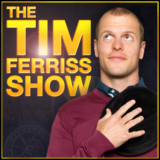Brought to you by Peloton Row premium rower for an efficient workout, Athletic Greens all-in-one supplement, and Eight Sleep’s Pod ...
Brought to you by GiveWell.org charity research and effective giving and 5-Bullet Friday, my very own email newsletter. Welcome to The Tim ...
Brought to you by GiveWell.org charity research and effective giving, Athletic Greens all-in-one supplement, and Allform premium, ...
Brought to you by Wealthfront automated investing, Helix Sleep premium mattresses, and Vuori comfortable and durable ...
Brought to you by LinkedIn Jobs recruitment platform with 800M+ users, Athletic Greens all-in-one nutritional supplement, ...
Brought to you by MasterClass online video lessons taught by 180+ of the world’s best, Athletic Greens all-in-one nutritional supplement, and ...
Welcome to another episode of The Tim Ferriss Show. This is a very meaningful episode to me. It is probably the most significant interview that I’ve ...
This is a rare day! I’m launching a new podcast for the first time in many years, and it’s scripted fiction. Even if you hate the name, I think most of you ...
Brought to you by MasterClass online video lessons taught by 180+ of the world’s best, Helix Sleep premium mattresses, ...
Brought to you by Athletic Greens all-in-one nutritional supplement, Theragun percussive muscle therapy devices, and Shopify global ...
Brought to you by Tommy John premium underwear, Eight Sleep’s Pod Cover sleeping solution for dynamic cooling and heating, ...
Brought to you by Maui Nui Venison wildly delicious venison, Athletic Greens all-in-one nutritional supplement, and Allform premium, ...
Brought to you by Eight Sleep’s Pod Cover sleeping solution for dynamic cooling and heating, House of Macadamias delicious and nutritious nuts, ...
Brought to you by Wealthfront high-yield savings account, ShipStation shipping software, and Athletic Greens all-in-one nutritional ...
Brought to you by Levels real-time feedback on how diet impacts your health, Athletic Greens all-in-one nutritional supplement, and LinkedIn ...
Brought to you by Athletic Greens all-in-one nutritional supplement, Eight Sleep’s Pod Cover sleeping solution for dynamic cooling and heating, and ...
This episode is brought to you by 5-Bullet Friday, my very own email newsletter. Welcome to another episode of The Tim Ferriss Show, where it is ...
Brought to you by Athletic Greens all-in-one nutritional supplement, Pique premium pu’er tea crystals, and Shopify global commerce ...
Brought to you by HEY premium email service, Theragun percussive muscle therapy devices, and LinkedIn Jobs recruitment platform with 800M+ users. ...
Brought to you by House of Macadamias delicious and nutritious nuts, Wealthfront high-yield savings account, and Vuori Clothing comfortable and ...
- « Previous Page
- 1
- …
- 9
- 10
- 11
- 12
- 13
- …
- 24
- Next Page »

